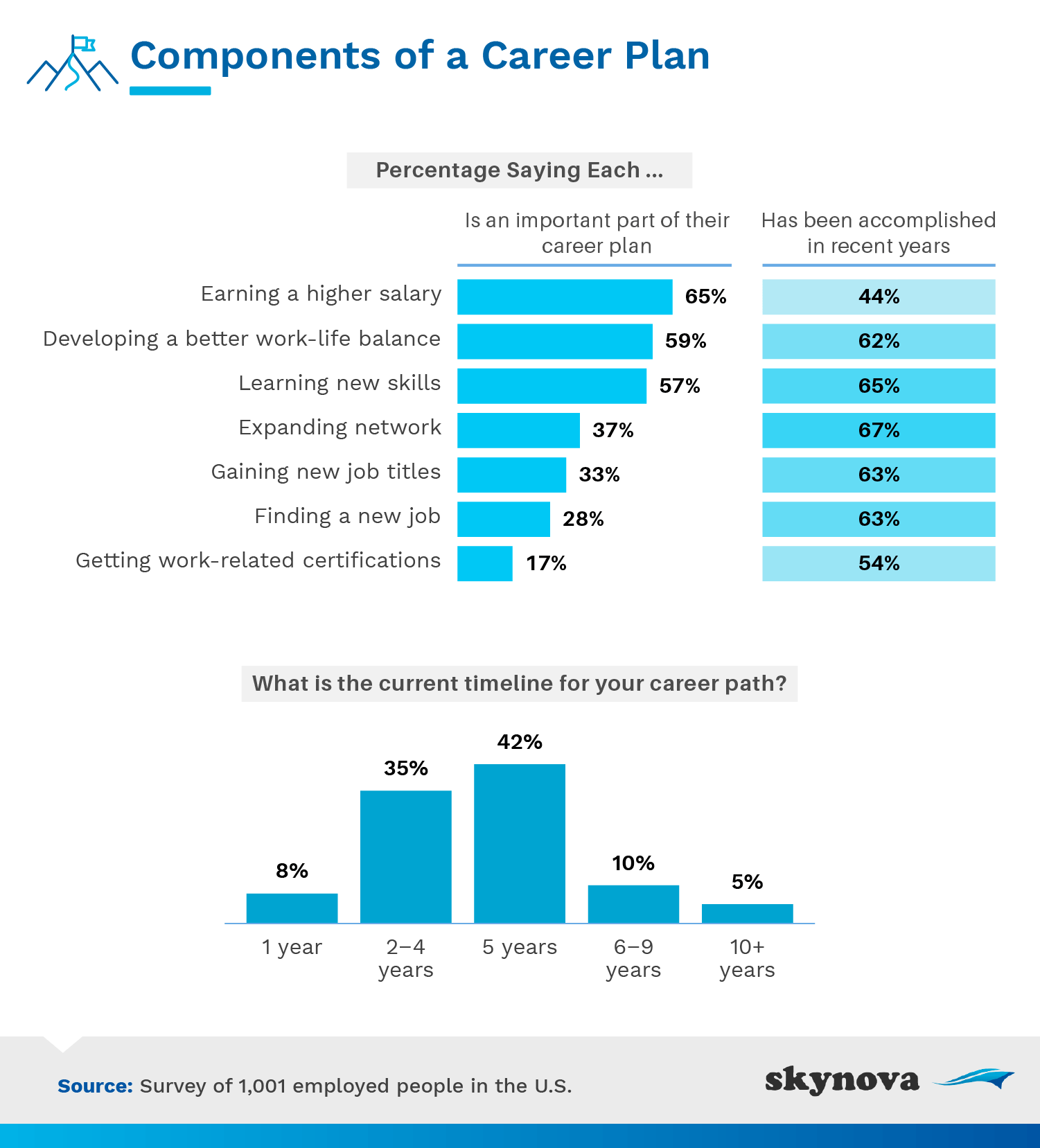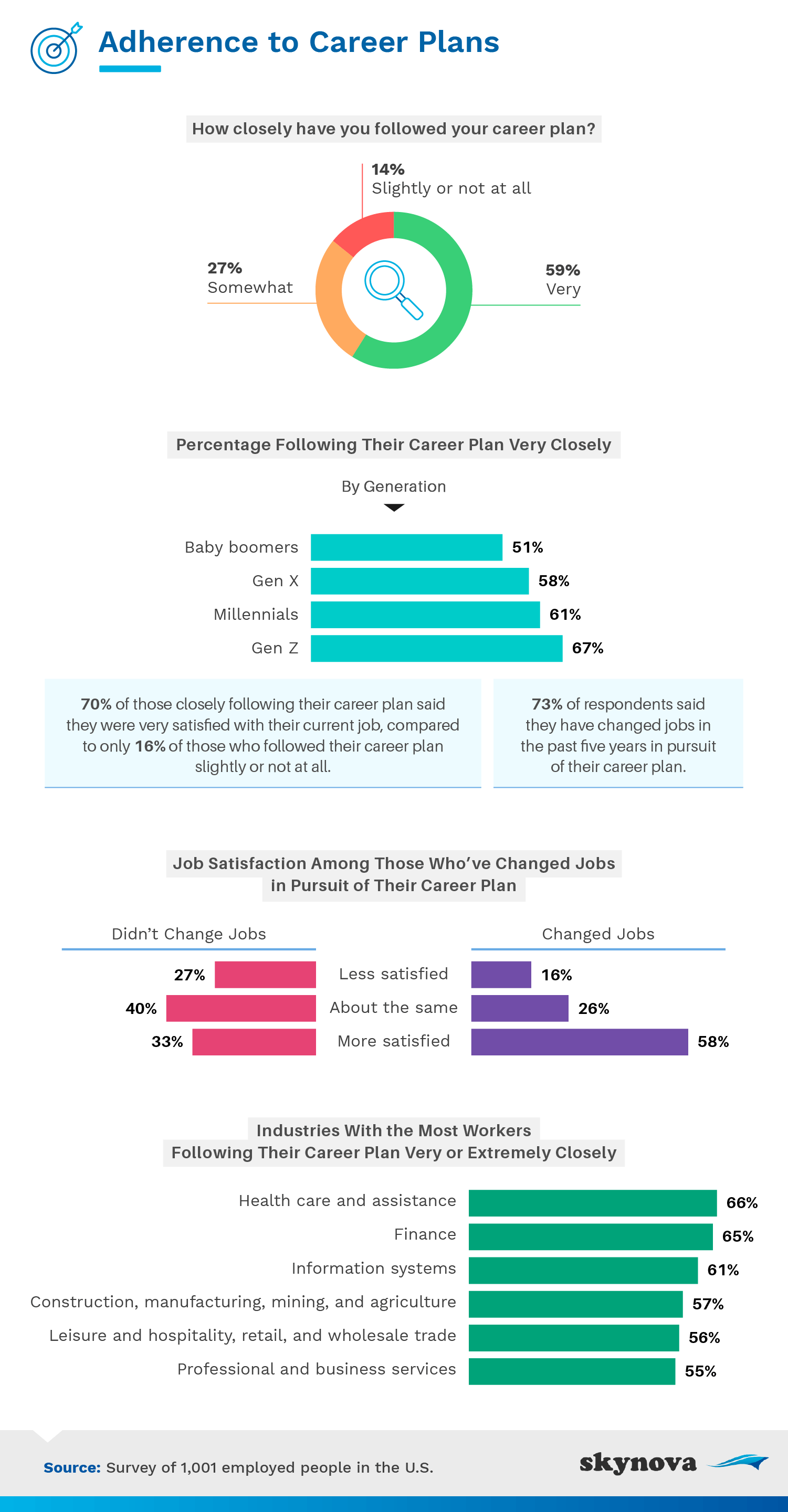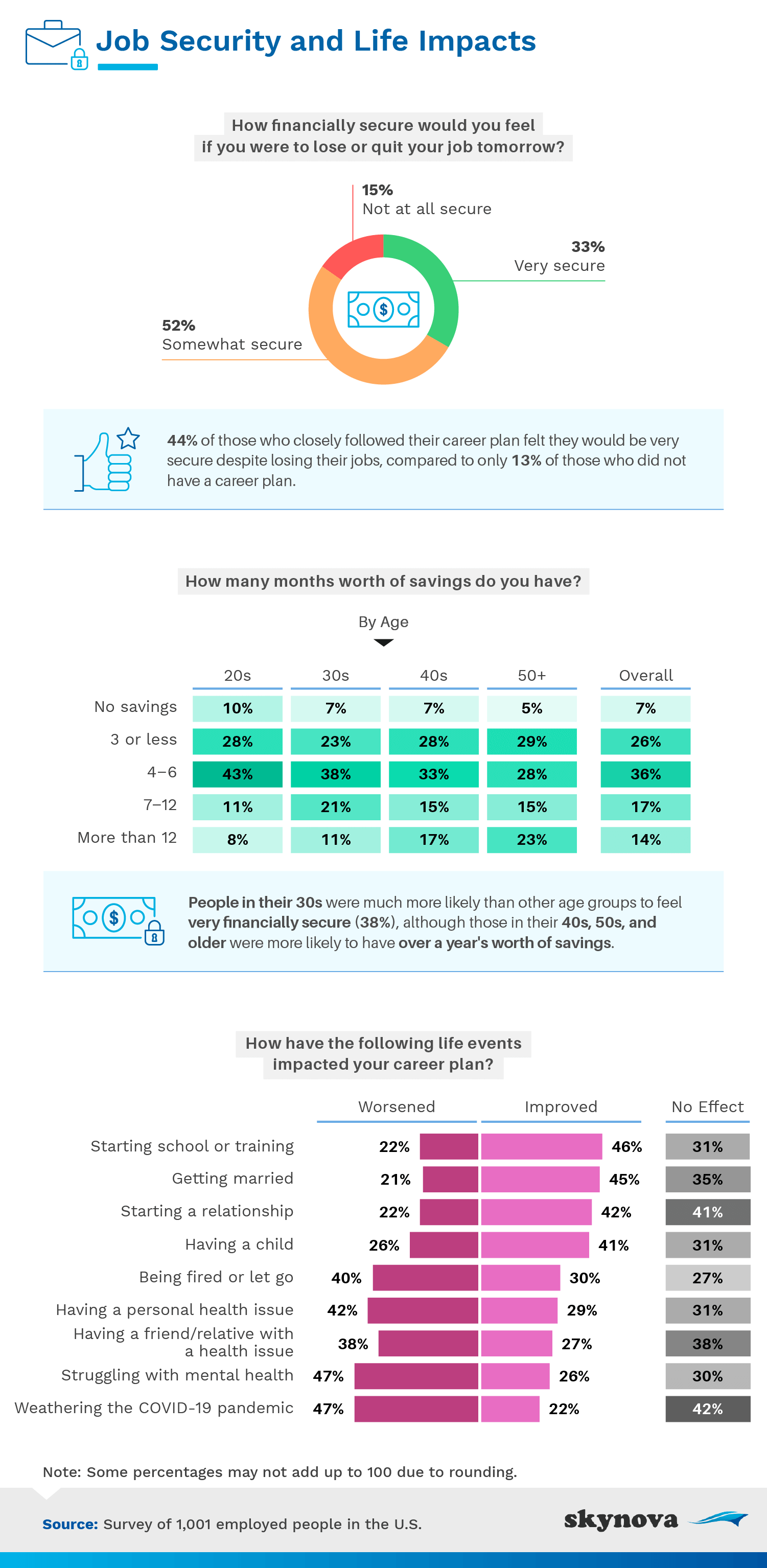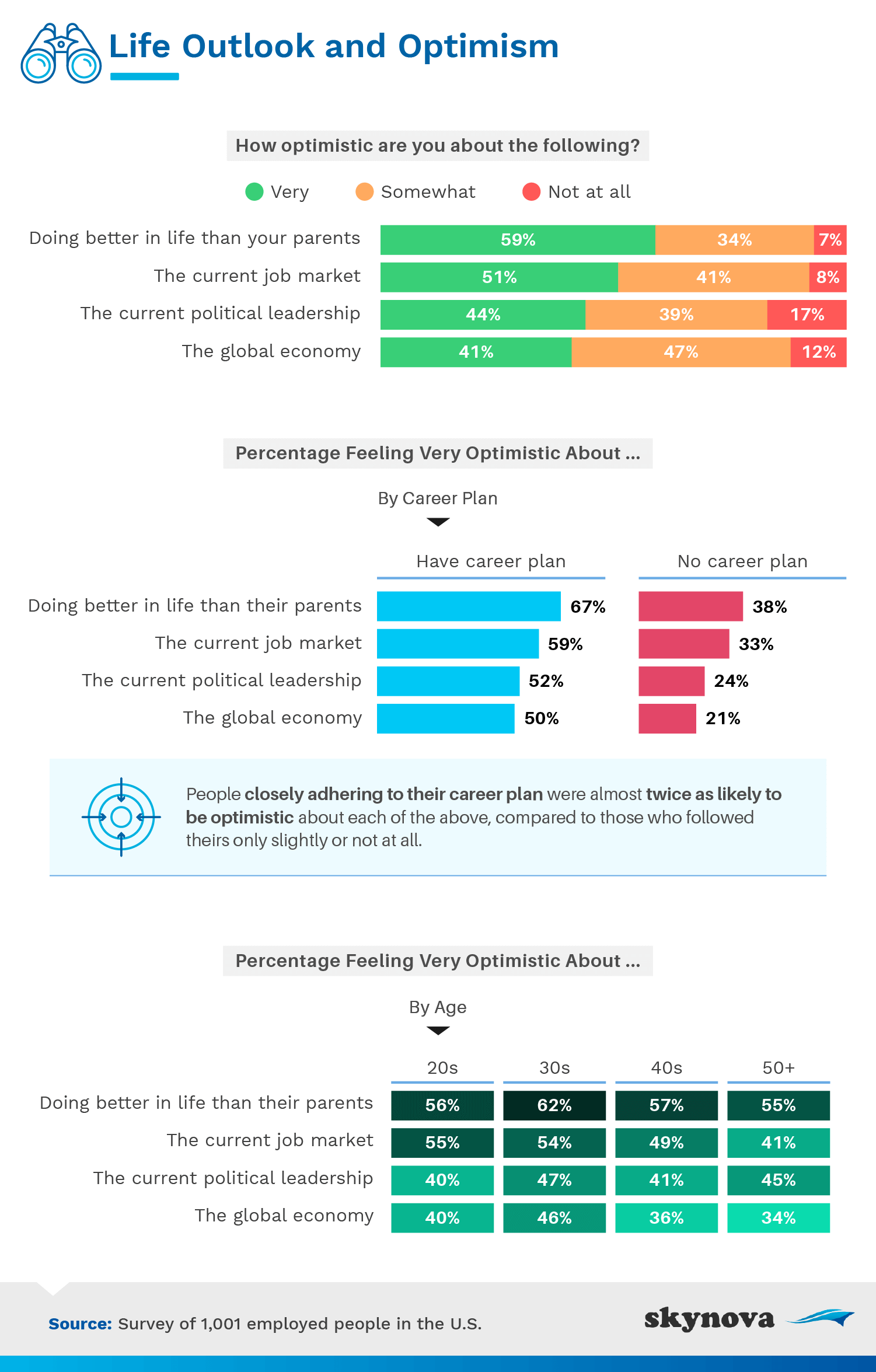
|
Almost everyone in the job market has had to answer this question at least once – where do you see yourself in five years? It is a difficult question to answer at the best of times. Professionals in every field have a career goal, and they usually have a mental road map for getting there. Everyone projects five years and 10 years into the future and makes at least a basic sketch of where they would like to be and what their life should look like.
We decided to find out how many people complete their five-year plans. We also looked at how many do not, what derails their plans or makes people change them, and the impact of these factors on their perceived quality of life.
We interviewed over 1,000 multigenerational workers from across the U.S. about their career plans and how well they have been able to stick to them. We found some surprising answers and some unexpected ones too. Interestingly, there were both clear divisions and unifying similarities between the responses we received from different generations.
Our data suggests that the vast majority of people (97%) have at least some outline of a career plan that they would like to stick to. However, only 59% said that they follow or have followed it very closely. This is going to become a critical differentiator between respondents in the sections to come.

According to our respondents, earning more money, achieving a better work-life balance, and learning new skills were the most popular career goals. The easiest to achieve were increasing network size (67%) and learning new skills (65%). Unfortunately, the most frequently cited goal (earning a higher salary) also turned out to be the most difficult to accomplish (44%).
While less than half of baby boomers (46%) were still thinking of their career goals in time spans of five years or more, 63% of Gen Xers and 57% of millennials said the same. Perhaps older generations have shorter plans because their career arc has mostly panned out, while younger respondents still have time left to focus on the long game.
Seventy-six percent of men and 68% of women reported changing jobs in the past five years as part of their career plan. More millennials said the same (77%) than baby boomers (64%) or Gen Xers (65%). Millennials and Gen Zers were also the most likely to say that they were following their plans very closely.

How closely a person follows their career plan seems to be directly related to job satisfaction, with 77% of those who had adhered to theirs closely reporting being satisfied with their current job. In comparison, among those who followed their plan only slightly or not at all, only 16% claimed job satisfaction. Health care, finance, and information systems were the industries with the most respondents following their plan closely or extremely closely.
When asked about how financially secure they would feel if they lost or quit their job tomorrow, a little over half (52%) said that they would be somewhat secure, while one-third felt they would be very secure. Notably, those who were following their career plans the closest were most likely to feel very secure (44%), while those who weren’t following their plan at all were least likely to feel the same (13%).

When asked about their savings in terms of the number of months their money would last if they stopped working tomorrow, the most common answer was four to six months. Those 50 and over were the most likely to have larger savings; 23% of this group reported that they would be able to last 12 months or longer without finding alternative employment. Not surprisingly, our youngest respondents (those in their 20s) were the least likely to have enough savings for over 12 months (8%).
Major life events are often portrayed as having a negative influence on career plans, but for most of our respondents, they were more likely to have a positive impact or no impact at all. This includes starting school or training, getting married, and having children. Even being let go or getting fired was reported as negative by only 40%, with 30% reporting it as positive and 27% saying it had no effect.
The two events ranked as having the greatest negative impact were mental health issues and the COVID-19 pandemic, as reported by 47% of respondents for each. There is a correlation between the two , too, with extensive research proving that the pandemic has contributed to increased levels of stress, depression, fear, anger, and more for many people around the world. Nevertheless, 42% of respondents said that the pandemic had had no effect on their career plans.
Reporting on their feelings about the path ahead, the majority of respondents felt very optimistic. Across all age groups, over half were very optimistic about doing better in life than their parents. Yet again, we saw that those with a career plan were significantly more likely than those without one to feel very optimistic about a variety of factors, from exceeding their parents’ achievements to the current job market, the current political leadership, and the global economy.

Those over 50 seemed to have the least optimistic outlook on the current job market, possibly because older workers are increasingly undervalued in their existing positions or overlooked in favor of younger hires when applying for new ones. Meanwhile, those in their 30s were the most optimistic about doing better than their parents, the current political leadership, and the global economy.
Based on the data, it can safely be concluded that having a long-term career plan and sticking to it is the best bet for a secure and happy professional future. It tends to lead to more job satisfaction and increased financial security. The data reveals that the COVID-19 pandemic and mental health issues jointly had the greatest negative impact on respondents' career plans. Surprisingly, however, 22% of people said their career had benefited from the pandemic – perhaps because they worked in industries that were pushed into overdrive by the crisis.
Overall, it seems that personal dedication is the main ingredient for sticking to a positive career path. Major life goals tend to help rather than hinder, and even a global pandemic was not an endgame situation for many of our respondents.
Skynova helps businesses get paid faster. Skynova offers easy-to-use but highly professional templates and accounting services to help businesses, both small and large, receive the payments they need to continue running smoothly. Skynova provides the professionalism, affordability, and reliability that every thriving business needs.
We used Amazon Mechanical Turk to collect responses from 1,001 employed people in the United States. 60% of our participants identified as men, 39% identified as women, and roughly 1% identified as nonbinary or nonconforming. Participants ranged in age from 20 to 84 with a mean of 39 and a standard deviation of 10.8. Those who reported no current employment or who failed an attention-check question were disqualified.
The data we are presenting rely on self-report. There are many issues with self-reported data. These issues include, but are not limited to, the following: selective memory, telescoping, attribution, and exaggeration.
We are happy to offer our findings freely to everyone. You are welcome to share them with all your friends and family members who need to know the importance of long-term career goals. All we ask is that you link back to this article whenever and wherever you are sharing these findings and to only do so for noncommercial purposes.